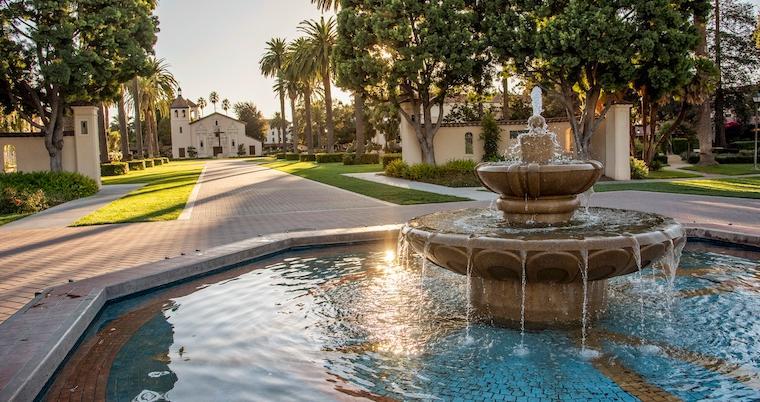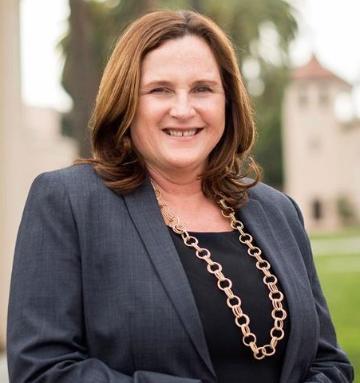
Santa Clara University Among Winners of the 2024 William T. Grant Foundation Institutional Challenge Grant
Funds will support collaborative research into pre-collegiate and college support programs for Latinx students
SANTA CLARA, Calif., June 5, 2024—Santa Clara University is one of four winners of the 2024 Institutional Challenge Grant, awarded by the William T. Grant Foundation, the Spencer Foundation, the Doris Duke Foundation, and the Bezos Family Foundation. The grant encourages research institutions to build long-term research-practice partnerships with public agencies or nonprofit organizations to reduce inequality in youth outcomes.
The three-year, $650,000 award will fund a partnership between The School of Education and Counseling Psychology of Santa Clara University, the Latino Education Advancement Foundation, and The Foundation for Hispanic Education to support college preparation, persistence, and completion for Latinx students.

“We are deeply honored to have been selected as a recipient of the 2024 Institutional Challenge Grant, one of the most competitive equity-oriented participatory research grants in education,” said Sabrina Zirkel, dean of the Santa Clara University School of Education and Counseling Psychology (ECP). “This community-based research partnership, which converges three mission-aligned organizations with strong Latinx leadership and deep community connection, represents a significant opportunity. Our collective aim is to strengthen program delivery, enhance data sharing and analysis, and improve handoffs across key transitions in student pathways between institutions. This initiative embodies our dedication to creating a more inclusive and equitable educational landscape."
The research, led by ECP scholars Pedro Nava, Jasmin Llamas, Argelia Lara, and Marco Murillo, aims to understand and tackle educational inequalities for East San José Latinx students transitioning from high school to college. Each scholar brings extensive experience in community-engaged research and expertise in the issues facing Latinx communities. Through surveys, interviews, and focus groups with students and families, the project will explore how high schools, nonprofits, and colleges can better prepare, support, and engage Latinx students to enhance their success and take full advantage of the collegiate experience. This research seeks to shed light on student experiences and guide interventions that build resilience and close persistent gaps.
“A systemic change needs to occur in our higher education systems to serve a huge population of students who aren’t being reached in our public education systems,” said Brittany Alvarez, executive director of the Latino Education Advancement Foundation. “LEAF wants to be part of that work and this partnership will deepen the areas of expertise we have around collecting and utilizing data for programmatic improvement and then sharing that research and best practices widely with all of the colleges and universities we work with.”
This collaboration is a natural progression in Santa Clara University’s long history of engagement in East San José. In 1986, SCU and three partner organizations launched the Eastside Project to provide community-based learning placements for students. By 2000, that program had grown into the Arrupe Center for Community-based Learning, one of SCU’s four interdisciplinary centers of distinction. Today it serves more than 1,200 undergraduates across 50 placement sites, many in East San José neighborhoods.
In 1995, Santa Clara launched the Eastside Future Teachers Project, which paired outreach to high school students from underrepresented communities who were considering teaching careers, with supplemental tuition scholarships and a supportive learning community. As National Hispanic University was winding down its operations in 2014, ECP adopted its bilingual teacher training program to sustain a graduate education degree program focused on preparing teachers from and for Latinx communities.
"As we strive to be the model for equitable education, our collaboration with Santa Clara University and LEAF on this valuable research underscores our commitment to understanding and addressing the challenges faced by Latinx students in their educational journey,” said Dr. Sherry Segura, CEO of The Foundation for Hispanic Education. “Through this project, we aim to eliminate opportunity gaps, celebrate diverse identities, and empower students from historically disadvantaged backgrounds for leadership and success."

About the William T. Grant Foundation
Founded in 1936, the William T. Grant Foundation supports research to improve the lives of young people in the United States. The Foundation’s grantmaking centers on studies that help build, test, and improve strategies to reduce inequality in youth outcomes and improve the use of research evidence in policy and practice. An independent, nonprofit grantmaking organization, the Foundation is based in New York City.
About the Latino Education Advancement Foundation
Established in 2019, The Latino Education Advancement Foundation develops programs that increase the number of Latinx students who enroll, persist, and complete college and obtain economically mobile careers in Silicon Valley.
About The Foundation for Hispanic Education
The Foundation for Hispanic Education was established in 1981 as a product of the late Dr. B. Roberto Cruz’s vision of providing quality education and support for all underserved learners, with a focus on Latinx students. With 106 committed staff members, The Foundation now serves over 1,050 students from the East San Jose community neighborhoods of Mayfair, Mt. Pleasant, Sylvandale, Santee, and Alum Rock. The Foundation also operates three charter high schools.
About Santa Clara University
Founded in 1851, Santa Clara University sits in the heart of Silicon Valley—the world’s most innovative and entrepreneurial region. The University’s stunningly landscaped 106-acre campus is home to the historic Mission Santa Clara de Asís. Ranked among the top 15 percent of national universities by U.S. News & World Report, SCU has among the best four-year graduation rates in the nation and is rated by PayScale in the top 1 percent of universities with the highest-paid graduates. SCU has produced elite levels of Fulbright Scholars as well as four Rhodes Scholars. With undergraduate programs in arts and sciences, business, and engineering, and graduate programs in six disciplines, the curriculum blends high-tech innovation with social consciousness grounded in the tradition of Jesuit, Catholic education. For more information see www.scu.edu.
Media Contact
Lisa Robinson | SCU Media Communications | lrobinson2@scu.edu | 408-551-3601